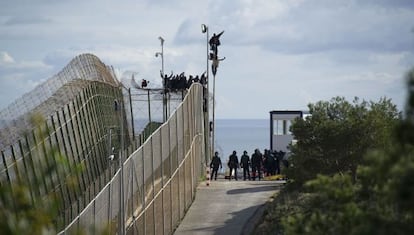Spain deporting migrants back to Morocco on the spot
Government claims sub-Saharans are not yet on Spanish territory and can be returned via fence Existing bilateral agreements involve identifying illegal aliens first

Six days after the latest massive run on the Melilla border fence, around 200 Africans tried a new jump on Thursday morning.
The Moroccan gendarmes prevented most of the sub-Saharans from crossing into Spanish territory, but 27 of them managed to climb atop the fence separating Morocco from this Spanish exclave. There they remained for over six hours, expressing joy at what they believed was the success of their enterprise with cries of “Freedom! Freedom!” as many fellow migrants had before them.
But this time, reaching the top of the fence did not automatically mean being taken to a holding center in Spain for emergency medical care, food and shelter. While one of the migrants was taken to hospital, the other 26 were marched right back to the Moroccan side. Existing bilateral agreements between Spain and Morocco regarding readmission of migrants involve paperwork that prevent law enforcement officers from turning back illegal aliens straight away without identifying them first.
The Spanish Interior Ministry considers that these are “rejections at the border” and that migrants may be turned away because technically they have not yet stepped on Spanish soil.
This time, reaching the top of the fence did not automatically mean being taken to a center
Legal sources consulted by the news agency Europa Press said that the Melilla fence is itself Spanish territory, and that people sitting on it are therefore in Spain and protected by its immigration laws, which say illegal aliens cannot be deported on the spot.
This is not the first time that migrants who make it as far as the fence have been returned to Morocco, however. The practice has become increasingly common, three months after migratory pressure on the Spanish cities of Ceuta and Melilla began growing exponentially: more than 1,600 sub-Saharans have made it through so far this year, which is more than for all of 2013.
The Socialist spokeswoman in Congress, Soraya Rodríguez, has asked the Popular Party (PP) government to “stop the deportations to Morocco, because they are illegal and cannot be kept up.”
Spain has asked Brussels for financial assistance to patrol these gateways to Europe, and Prime Minister Mariano Rajoy put illegal immigration at the top of an EU-Africa summit earlier this week.







































